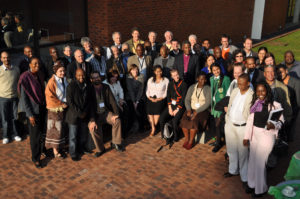Dr. Aminata Touré, former Prime Minister of Senegal (2013-2014) and World Leadership Alliance-Club de Madrid (WLA-CdM) Member, called for a balanced approach to leave no one – and leave no country – behind as the international community faces the challenges of redesigning global public health security systems following the ravages of the COVID-19 pandemic.
Dr. Touré issued these criteria during the first Global Summit of the UNITE Global Parliamentarians Network to End Infectious Diseases, held on 8 September 2020. Expert panelists considered strengthening the global health security system through a Global Public Health Convention which develops greater capacities and enforcement mechanisms than are available at present.
Prime Minister Touré framed her points noting that health is a human right with both moral and legal responsibilities for all countries in the international community. This requires capacity and many African countries have had to count on themselves to fend off the global COVID-19 pandemic. Fortunately, many of them took early action to mitigate the spread of the pandemic.
As we go forward, we must work to ensure shared responsibility, accountability and trust in institutions at the local, national and global levels. Pandemics transcend borders, requiring a coordinated global response. Prevention, therefore, depends on international cooperation and adequate resources.
Yet since local officials and agencies bear the brunt of public health challenges, it is imperative that agencies like the World Health Organization have more resources to support resiliency at the national level. This will require a balanced approach to future cooperation and accountability for public health in order to increase capacity at local levels and also reinforce the ability to cooperate. Global mechanisms are only relevant if they resonate with and support effective response at national and local levels.
This is yet another example of WLA-Club de Madrid Members working to share their leadership experience in defining more effective responses to both the ongoing COVID-19 pandemic and future crises.

